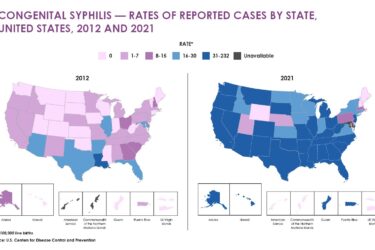Climate change has been making the headlines.
More than 300,000 people kicked off Climate Week NYC 2014 with a march through the streets of New York, in what has been called the largest demonstration on climate change ever. The march coincided with U.N. meetings on climate change and the introduction of the Climate Change Health Promotion and Protection Act by Sen. Edward J. Markey (D-Mass.).

During Climate Week, Jonathan Patz, M.D., M.P.H., director of the Global Health Institute at the University of Wisconsin, presented an extensive literature review on the health consequences of climate change at the Civil Society Event on Action in Climate Change and Health. The paper was published in the Journal of the American Medical Association on Sept. 22.
The study focused on the ways in which climate change affects health and is especially important for health writers. If you want to cover the intersection of climate change and health in your area, but don’t know where to start, you might find these areas of Patz’s research especially helpful:
Heat-related death and illness. Frequency of extreme heat days is projected to increase across the United States, and affected groups include the elderly, people living in poverty or isolation, and those suffering from mental illness.
Occupational health. By 2050, heat stress is projected to decrease global labor capacity by 10 percent.
Respiratory disorders. More hot days correlate strongly with increased ozone, and 43 million people in the U.S. live in areas that exceed the EPA standards for fine particulate matter.
Allergies and pollen. Ragweed season has been lengthening by 13-27 days north of the 44th parallel (Oregon, Idaho, Wyoming, South Dakota, Minnesota, and Wisconsin) since 1995. Depending on your area, you might look into oak and hay fever seasons also.
Infectious diseases. Vectorborne diseases such as malaria are projected to increase with temperature, but waterborne diseases in the U.S. may be more relevant in your area. Sewage overflow after heavy rain can cause an increase in Campylobacter, Giardia, Cryptospiridium, noroviruses and enteroviruses.
Climate-related disasters and displacement. Evidence suggests Category 4 and 5 hurricanes may be occurring more frequently, and you may find health-related stories in the aftermath of storms like those (think Hurricane Katrina or Superstorm Sandy).
Social determinants of health in the context of climate change. While Patz did not include this as a specific category, he addresses the issue indirectly throughout his paper. In particular, he encourages the “design of carbon reduction policies with ancillary benefits,” such as better air quality and less asthma, or urban design that promotes fitness. Rates of obesity and diabetes are at least 20 percent lower in U.S. cities the highest levels of “active transport” (as opposed to the lowest). According to Patz, this means 1,295 lives could be saved each year in the upper Midwest simply by replacing car trips under 4 kilometers (about 2.5 miles) with bike travel. Look into urban design initiatives in your area and research local rates of asthma, obesity and diabetes.
Factory farming. Agriculture, livestock production and forestry make up 24 percent of global greenhouse emissions. If you live in a farming-intensive area and want to cover nutrition, consider the climate angle. Patz points out that the greenhouse emissions supporting a diet high in red meat (over 100 grams per day) are nearly twice that of vegetarian diets.
If you want to cover these or any other health topics related to climate change, remember to keep Patz’s integrated approach in mind:
“Climate change is an enormous public health challenge because it affects our health through multiple pathways,” he said. “But if the risks are so interdependent, so, too, are the opportunities.”
Helpful resources for making those connections:
- Particulate Matter Standards (EPA)
- CDC: Asthma Data (CDC)
- CDC: Designing and Building Healthy Places (CDC)
- IPCC: Intergovernmental Panel on Climate Change (IPCC)
- National Institute of Allergy and Infectious Diseases (NIAID)
- American Academy of Allergy, Asthma, and Immunology – Pollen Links (AAAAI)
Recent coverage of climate change and Climate Change Week 2014:
- Climate change poses wide-ranging dangers to public health, experts warn, MinnPost, Sept. 24, 2014
- APHA supports Senate bill addressing climate change health impacts, American Public Health Association (APHA) Public Health Newswire, Sept. 24, 2014
- ‘Largest-ever’ climate change march rolls through NYC, USA Today, Sept. 22, 2014
- A sizzling cocktail that serves as a climate warning, The New York Times, Sept. 26, 2014
- Making sense of this week’s climate change news, PBS NewsHour, Sept. 23, 2014
- Actions on climate change bring better health, study says, Global Health Institute, Sept. 22, 2014
Past presentations and tip sheets from AHCJ:
- Ten Comments on the Health Risks of and Public Health Responses to Climate Change, Kristie Ebi, M.P.H., Ph.D., Health Journalism 2008
- Three presentations from Health Journalism 2009:
- Heat-Related Mortality in Washington State: Past and Future, J. Elizabeth Jackson, M.A., Health Journalism 2009
- Climate change, air quality, and health: A study and some other comments, Catherine Karr, M.D., Ph.D., M.S., Health Journalism 2009
- Climate Change, CO2 and Public Health: The Botanical Perspective, Lewis Ziska, Ph.D., Health Journalism 2009 (Study)
- Reporting on the intersection of health and the environment








